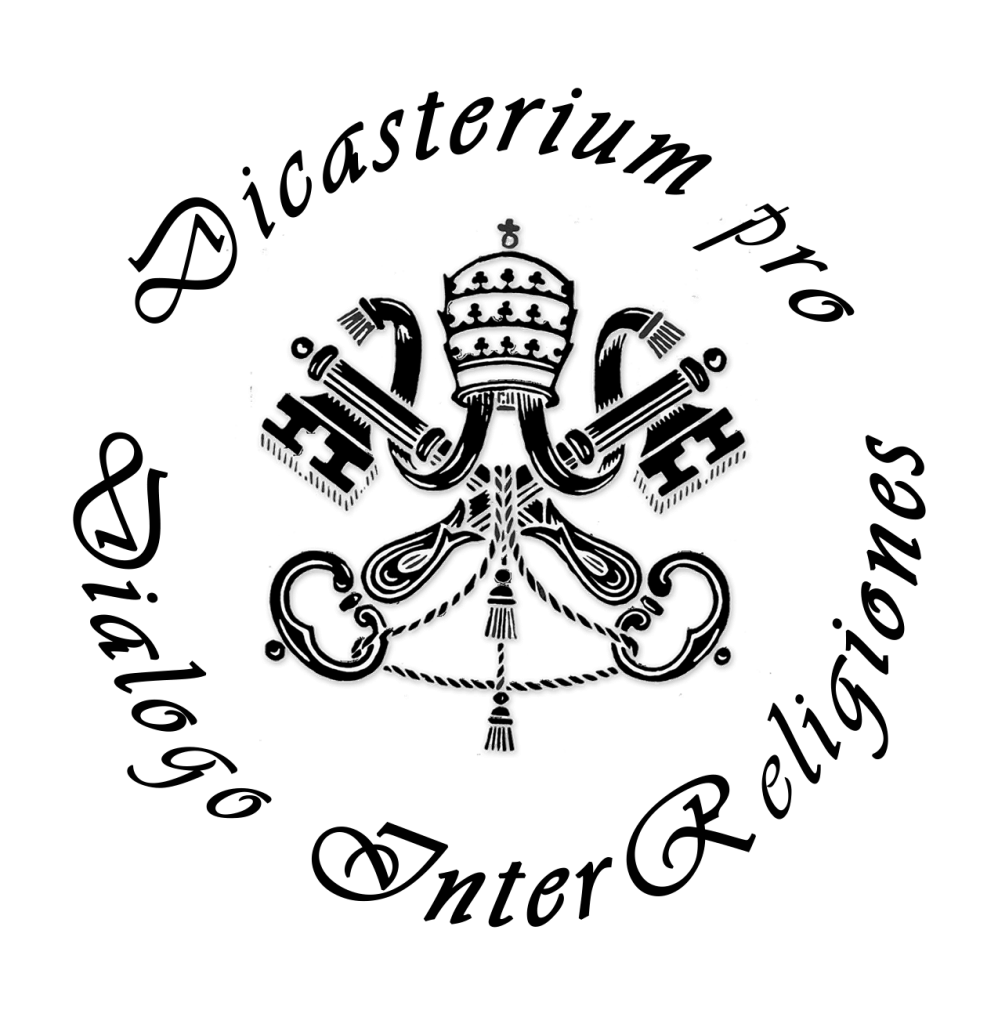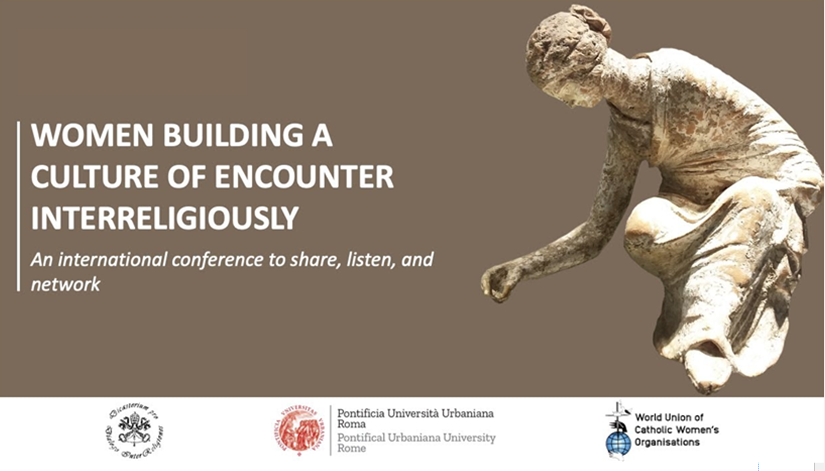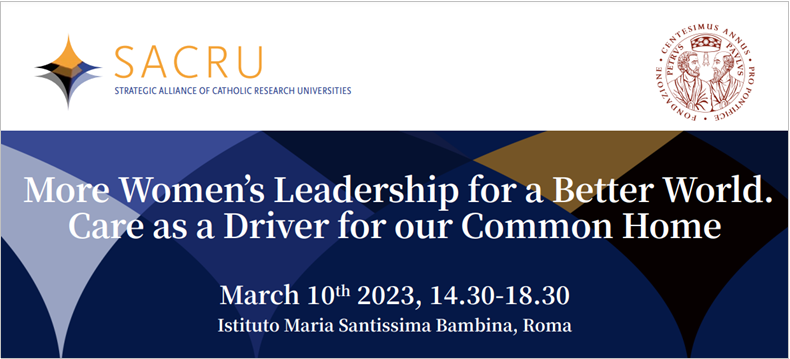March 8 is globally recognized as International Women’s Day, and the month of March is designated as National Women’s History Month in the United States. As such I would like to report and reflect on two recent events that celebrated the contributions of women, yet remind us that there is still much more we need to do to advance the dignity, rights and equality of women and girls.
Interreligious Contributions
The Dicastery of Interreligious Dialogue (DID) is the Holy See’s guide to the universal Church’s interaction with people of other religions. Founded to advance the Second Vatican Council’s Declaration on the Church’s Relation to Non-Christian Religions (Nostra aetate), it has produced important texts for interreligious understanding as well as hosting meetings in many parts of the world.Two months ago in January, the Dicastery, in collaboration with the World Union of Catholic Women’s Organisations and the Pontifical Urban University, hosted the three-day conference “Women Building a Culture of Encounter Interreligiously.” The purpose of this historic event was to support and strengthen the interreligious contributions of women:
“Working towards a culture of encounter requires wider acknowledgement and promotion of women’s inherent dignity and participation…
The promotion of women’s equal dignity and rights should also be reflected in interreligious dialogue and cooperation. Accordingly, we need to include more women at dialogue tables, where they are still outnumbered by men. Women have unique and indispensable gifts to bring to the building of this culture of encounter: among others, an inclination to listen to, understand, and care for the other, a persevering presence in the midst of difficulty, and maternal wisdom to make concrete and to nourish the desires and aspirations of our wounded humanity.” (DID website)
Women Building a Culture of Encounter Interreligiously
Thirty women from 23 countries and 12 different religious traditions (Christian, Muslim, Jewish, Buddhist, Sikh, Zoroastrian, Confucian, Taoist, Jain, Hindu, Shinto (Oomoto) and African Traditional Religion) convened together in Rome from January 25-27.
The expressed three-fold goal of the conference was:
- “To appreciate and encourage the role of women and women’s leadership in social, economic, religious and political life at local, national and international levels;”
- “To rediscover how our respective religious classics, saints/sages, religious arts and music can be shared to reawaken our spiritual energy, to heal us and the world;”
- “To learn from the stories of women in fostering interreligious dialogue and a culture of encounter.”
All 30 women presented and participated in panels and open discussions across seven sessions in three days. They shared their experiences and interreligious work (e.g., peacebuilding, healthcare, political activity) from within their own faith and cultural traditions and examined various issues (e.g., discrimination, inclusivity, female leadership) related to building a culture of encounter.
This first-time conference is intended to lead to future interreligious opportunities and platforms for women leaders under the auspices of the Dicastery of Interreligious Dialogue. As such, the women concluded the conference with a sustained dialogue on the panel, “Where do we go from here?”
You can watch videos of the conference proceedings on the Vatican News’ YouTube channel: Day 1, Day 2 and Day 3.
In addition to dialoguing and networking with one another, the women also met with Pope Francis on January 26 in a private audience. His address appears below.
More Women’s Leadership for A Better World
Pope Francis’ address above emphasizes the ways whereby women can make unique contributions to the society in which they live. As the Holy Father noted, “The commitment and effort to foster the dignity of women and girls in particular” has been expressed in many ways by the communities and twelve religions represented among the participants at this conference.
The accomplishments of these women should be recognized and commended, and we should work to ensure their justice and peace initiatives are cultivated further! They continue to overcome great difficulties and hardships in advocating for others.
And yet there are still a vast number of women, inside and outside the periphery of the women leaders represented in the conference, who are voiceless and powerless.
I would therefore like to draw attention to the publication of the joint research project, More Women’s Leadership for a Better World: Care as a Driver for our Common Home. This research, which has been published in hard copy and e-format, was presented in a conference in Rome on March 10 during proceedings that included two roundtables: “Topicality of the presence of women in top positions” and “Women’s contributions to the solutions of the challenges of the new world.” SACRU has made a video of the event available here.
Promoted by the Strategic Alliance of Catholic Research Universities (SACRU) and the Centesimus Annus Pro Pontifice Foundation (CAPPF), the published text has a Preface by the Holy Father and is edited by the President of CAPPF, Professor Anna Maria Tarantola. As Pope Francis notes in his foreword, “This book is about women, about their talents, their abilities and skills as well as the inequalities, violence and prejudices that still characterise the female world.”
The book’s research, a multidisciplinary collaborative effort of 15 academics from 10 Universities in eight countries, “makes an important contribution to the understanding of gender inequalities in leadership positions in the world of academia, entrepreneurship and society.” Equally important, “It analyses the actual situation, the causes, the persisting obstacles and identifies some corrective actions.” (From the official description by publisher Vita e Pensiero).
Pope Francis offered the following remarks to the participants of the conference during a private audience on March 11:
Education is key
I encourage everyone to read More Women’s Leadership for a Better World and then act according to your own ability and circumstance. The text has been published in English, Italian and Spanish online here.
We can all begin educating ourselves and others within our families, religious communities and schools by examining and deconstructing the prevalence of negative and often violent thoughts and opinions that lead to practices and social “norms” that violate the basic rights of women and girls. As Pope Francis reminds us:
“On the one hand, education is the main way to provide women with the skills and knowledge they need to face the new challenges of the world of work; on the other hand, it is necessary to promote change in the still prevailing patriarchal culture. Unfortunately, even today, some 130 million girls in the world do not go to school. There is no freedom, justice, integral development, democracy and peace without education. (Pope Francis, “Preface,” More Women’s Leadership for a Better World, p. 7)
May we all do our part, no matter how big or small, to ensure the dignity, rights and social equality of women and girls are advanced, accelerated and placed highly on the agendas of grassroots, national and global organizations alike!



